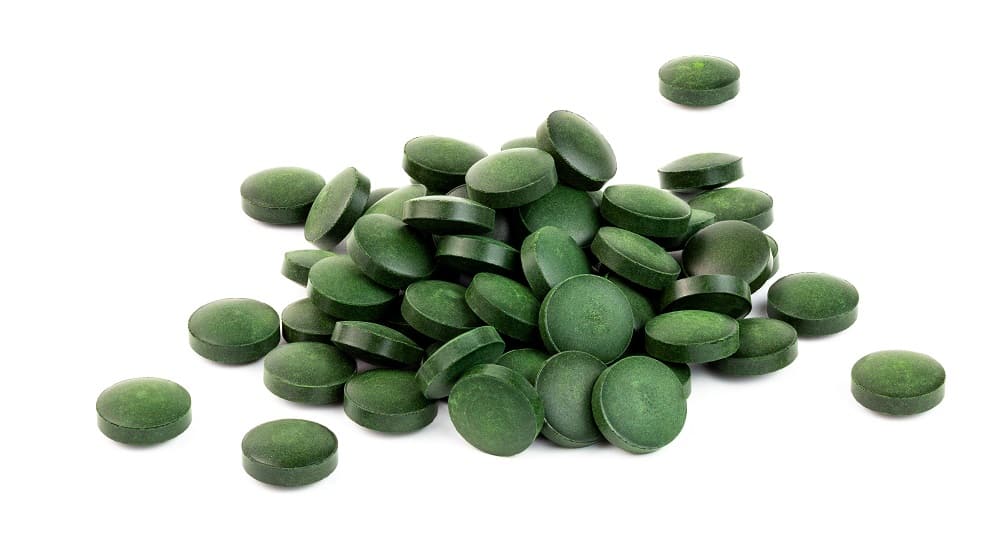Spirulina is a food product derived from algal biomass. First observed in ancient Mexico, spirulina is touted as a “superfood,” a food item that is densely packed with nutrients. Aside from being consumed as a food product, spirulina is also commonly marketed as a supplement for its nutritional intake.
Derived from blue-green algae, pure spirulina is completely vegan. It is an excellent source of protein for vegans as more than half of the dry weight of spirulina is made of protein. Spirulina is also a rich source of vitamins and minerals and has been studied to confer numerous health benefits such as the reduction of heart disease, obesity, and certain cancers. However, spirulina is also often marketed in the form of a supplement and many inactive ingredients used in spirulina supplements are not vegan such as gelatin and shellac.
Table of Contents
Spirulina

Spirulina is the edible biomass of cyanobacteria, also known as blue-green algae. Originally, the edible food product was derived from species under the Spirulina genus. However, due to taxonomic updates, the food product called spirulina is currently obtained from species under the genus Arthrospira: A. platensis, A. fusiformis, and A. maxima (1).
Spirulina was first discovered by Hernando Cortez, a Spanish scientist, along with the Conquistadors in 1519. The Spanish scientist found that spirulina was served at the tables of the Aztecs during his visit to Lake Texcoco in the Valley of Mexico.
This observation was verified by French scientists in the 1960s when they found the cyanobacteria growing abundantly at Lake Texcoco.
Spirulina is an excellent source of nutrition. According to the USDA FoodData Central database (2), a hundred grams of raw spirulina contains about 290 calories, 57.47 grams of protein, 7.72 grams of fat, and 23.90 grams of carbohydrates.
It also contains a wide host of vitamins and minerals such as calcium (120 mg), iron (28.5 mg), magnesium (195 mg), potassium (1363 mg), zinc (2 mg), vitamin C (10.1 mg), vitamin B1 (2.38 mg), vitamin B2 (3.67 mg), vitamin B3 (12.82 mg), vitamin B5 (3.48 mg), vitamin B6 (0.364 mg), vitamin B9 (94 µg), vitamin A (29 µg), vitamin E (5 mg), and many others.
Is Spirulina Vegan?
Spirulina is derived from algal sources such as edible seaweed. Devoid of animal products or derivatives, this makes spirulina completely suitable for vegan diets and lifestyles.
People can purchase dried spirulina in powdered form and incorporate it into their diets by adding spirulina powder to smoothies. The spirulina powder can also be added to soups and salads for added nutrition and taste.
However, concern should be advised for people who take spirulina supplements. The spirulina powder or extract inside the supplements are perfectly vegan, but common inactive ingredients used to make supplements might not be completely vegan.
Spirulina Supplements

Since spirulina has been proven to be densely packed with sufficient macronutrients (e.g., proteins, fats, carbohydrates) and a rich array of micronutrients (e.g., vitamins and minerals), people take spirulina supplementation via tablets and capsules for additional nutrients.
As a superfood, spirulina boasts having 180% more calcium than whole milk, 670% more protein than tofu, 3100% more carotene than carrots, 5100% more iron than spinach, and more antioxidants in 3 grams of spirulina compared to 5 servings of fruits and vegetables.
Other people take spirulina supplementation for the proposed health benefits. Many studies have shown the potential health benefits provided by spirulina consumption (3). A review of the literature would present that spirulina is suggested to exhibit immune system modulation, antiviral activity, cancer preventative properties, and cardiovascular benefits.
While spirulina is vegan, many inactive ingredients used to create supplement tablets and capsules are possibly derived from animal sources. Here are some examples of ingredients used in supplements that are problematic or possibly non-vegan.
Gelatin
Compared to tablets, some people prefer to take supplements and medications that come in soft-gel capsules for easier intake. However, the main protein used to create these soft-gel capsules is gelatin.
Although gelatin can indeed be obtained from vegan sources, such as seaweed, gelatin is typically derived from animal products (i.e., by boiling skin, tendons, ligaments, or bones). As such, it is safer to assume that soft-gel capsules utilize gelatin that is non-vegan unless specifically stated on the packaging.
Shellac
A common ingredient in the pharmaceutical industry, shellac is used as a coating to give medications and supplements a smooth and shiny finish.
However, shellac is non-vegan as it is the resin produced by the female lac bug (Kerria lacca). This insect produces the resin in preparation for its soon-to-hatch eggs and the resin is collected from the forests of India and Thailand.
Magnesium Stearate
Another common ingredient found in supplements is magnesium stearate, a typical additive added to medication capsules. It is considered a “flow agent” as it helps facilitate the manufacture of medication in capsules by preventing the individual ingredients from coagulating with each other and sticking to the machine that produces them. Thus, it helps maintain the consistency of the quality of the capsules.
However, magnesium stearate is a gray area for vegans since it can be produced from both animal and plant sources. Unless stated on the packaging or asking the company directly, it is difficult to determine whether this additive is vegan or not.
Caprylic Acid
Similar to magnesium stearate, companies can also use caprylic acid instead. Serving the same general purpose as magnesium stearate, caprylic acid can also be used as a filler or a coating lubricant.
While caprylic acid can be obtained from plant sources such as coconut and palm oil, caprylic acid is a gray area ingredient because it can also be obtained from goat, sheep, and cow’s milk.
References




